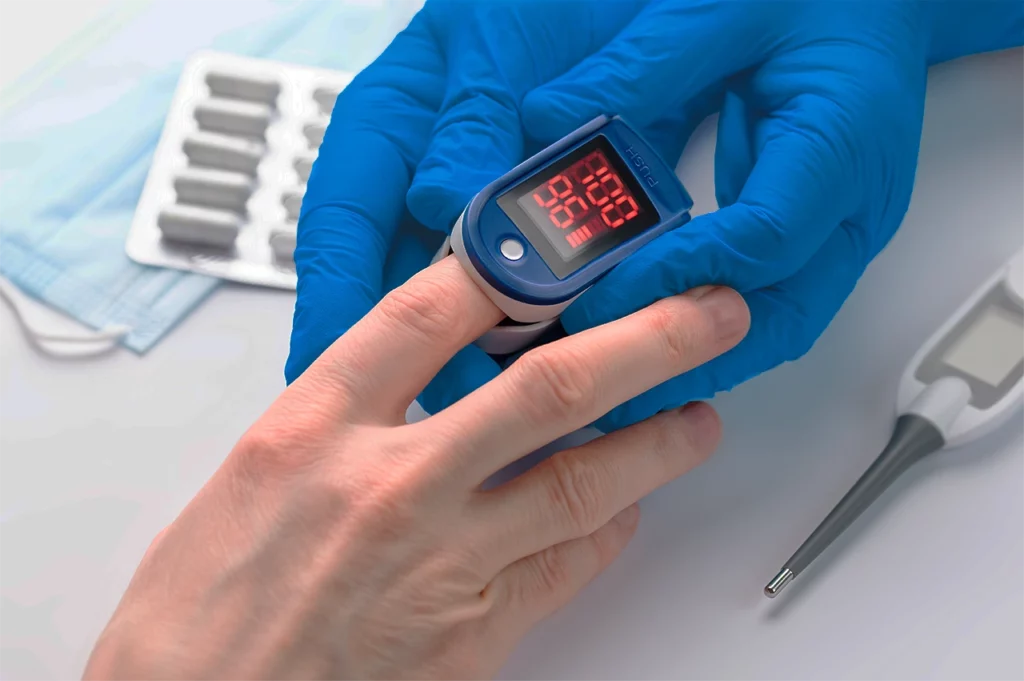Hypoxemia is a medical condition characterized by abnormally low levels of oxygen in arterial blood, which can result in serious consequences for the body.
What is hypoxemia
During hypoxemia, the abnormally low oxygen levels in arterial blood mean that the body’s organs and tissues are affected, since oxygen is transported through hemoglobin in red blood cells.
Hypoxemia can be detected by tests such as arterial blood gas analysis or pulse oximetry; when oxygen levels are below the normal values of 80 mmHg in arterial blood, the body can suffer severe consequences.
There are different degrees of hypoxemia, ranging from mild to severe, depending on how low oxygen levels are and how quickly this condition develops.
Among the symptoms of hypoxemia are difficulty breathing, confusion, fatigue, tachycardia, and cyanosis, which is a bluish discoloration of the skin.
In severe cases, hypoxemia can lead to irreversible damage to vital organs such as the kidneys, heart, or brain.
Causes of hypoxemia
There are multiple medical conditions or external factors that can result in the development of hypoxemia, usually classified according to the mechanism that affects oxygenation.
- Alterations in pulmonary gas exchange: the exchange of oxygen and carbon dioxide takes place in the alveoli of the lungs; when this process is impaired, hypoxemia may occur. Some causes include chronic obstructive pulmonary disease (COPD), pneumonia, pulmonary edema, and pulmonary fibrosis.
- Hypoventilation: occurs when breathing is insufficient to maintain normal oxygen levels in the blood and may be caused by respiratory depression due to certain medications, neuromuscular disorders, or airway obstruction.
- Intrapulmonary shunt: a shunt occurs when part of the blood passing through the lungs does not become adequately oxygenated. This can result from arteriovenous malformations or pulmonary atelectasis, which is the collapse of part of the lung, preventing air from reaching the alveoli.
- High altitude: at higher altitudes, the partial pressure of oxygen in the air decreases, which can cause hypoxemia in individuals not used to such heights. This is known as hypoxic hypoxia.
- Alterations in oxygen transport: oxygen levels in the lungs may be adequate, but problems in hemoglobin or circulation can also cause hypoxemia. This includes conditions such as anemia or carbon monoxide poisoning.
- Other causes: some less common respiratory diseases can contribute to hypoxemia, such as pulmonary embolism, sepsis, or congenital heart diseases.
Hypoxia and hypoxemia
While the terms hypoxia and hypoxemia are related and frequently used interchangeably, they actually refer to different concepts.
Hypoxemia refers to a decrease in oxygen in arterial blood, while hypoxia refers to a deficiency of oxygen in the body’s tissues, which may be generalized or localized, affecting only one organ.
In general, hypoxemia usually precedes hypoxia, since blood with low oxygen levels cannot adequately supply the tissues. However, it is also possible for someone to develop hypoxia without having experienced hypoxemia—for example, in ischemic hypoxia, where blood circulation to an organ is compromised as in a stroke, or in cytotoxic hypoxia, where cells are unable to use oxygen due to a metabolic dysfunction, such as in cyanide poisoning.
Hypoxia is a serious condition that requires immediate medical attention, as it poses a risk of compromising the function of vital organs.
For proper care, it is necessary to identify the underlying cause and treat it while seeking to prevent permanent organ damage.
At the ABC Medical Center’s Internal Medicine Department, we can provide specialized care. Contact us!
Fuentes
MSD Manuals, MAPFRE, Kids Health



